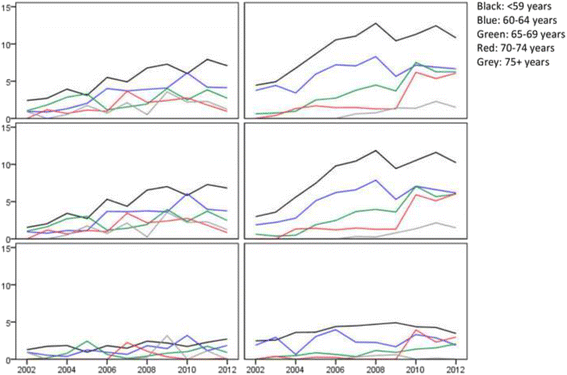Psychiatric care utilization among older people with intellectual disability in comparison with the general population: a register study
- PMID: 27829383
- PMCID: PMC5103447
- DOI: 10.1186/s12888-016-1094-0
Psychiatric care utilization among older people with intellectual disability in comparison with the general population: a register study
Abstract
Background: People with intellectual disability have been found to have higher prevalence of psychiatric disorders than the general population. However, they do not seem to have a corresponding increase in psychiatric care utilization. The aim of the present study was to investigate psychiatric care utilization among older people with intellectual disability.
Methods: We used a cohort of people with intellectual disability, 55+ years in 2012 (n = 7936), and an equally sized age and sex matched reference cohort from the general population. Psychiatric care utilization was measured using registrations in the Swedish National Patient register during 2002-2012, where each registration corresponds to a psychiatric care occasion.
Results: About 20 % of those with intellectual disability had at least one registration during the study period, compared to some 6 % in the general population sample. In the whole cohort as well as stratified by sex, people with intellectual disability were 3-4 times more likely than those in the general population sample to have had at least one registration during the study period. The effect was, however, only consistent in age groups comprising people younger than 65 years. Among people with intellectual disability, men were more likely than women to have had at least one registration, and people living in special housing (group home or service home) during the entire study period were less likely than those who only lived in special housing for parts of the study or not at all. People with intellectual disability had longer stays per inpatient registration compared with the general population sample. When stratifying on sex, the effect was found only among men, although there were no sex differences within the cohort of people with intellectual disability. Among people with intellectual disability, living in special housing during the entire study period was associated with shorter stays per inpatient registration.
Conclusions: Although people with intellectual disability had higher psychiatric care utilization than the general population during the 11 year study period, it does not correspond to the high prevalence of psychiatric disorders in this population. Future research is required to establish if the level of care utilization is appropriate among older people with intellectual disability.
Keywords: Age differences; Cohort studies; Hospitalization; Learning disabilities; Mental retardation; Sex differences.
Figures


References
MeSH terms
LinkOut - more resources
Full Text Sources
Other Literature Sources

